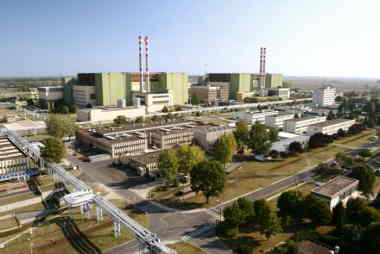Hungary's nuclear power plant, Paks, is set to operate for another 20 years with approval from nuclear safety regulators. The plant supplies over 40% of the country's electricity.
 |
| The four VVERs at Paks |
The first reactor at the Paks plant was started in December 1982, with three more following by 1987 to complete the largest industrial investment in Hungarian history.
The country's commitment to nuclear energy has paid off, said the plant operator - a subsidiary of state-owned Hungarian Power Companies Ltd (Magyar Villamos Művek, MVM) - given that the cost of generating electricity at Paks has never increased faster than the rate of inflation, establishing it as the lowest cost generator in the country.
The four units have operated with 30-year load factors of 80-90%, according to data from the International Atomic Energy Agency, producing a total of over 350 billion units of electricity.
In December last year the Hungarian Atomic Energy Authority completed its review of a proposal to operate the four reactors for a further 20 years, publishing a positive decision. An officially renewed licence is to be issued this year that will enable operators to keep unit 1 working until 2032, subject to economic and safety considerations. Similar decision for the other three units are expected to follow.
"The nuclear power plant is an important tool in the fight against climate change and it is not surprising that surveys show 75% support among the public."
István László Hamvas
CEO of Paks Nuclear Power Plant
The licence extension comes after a program of upgrades and modernisation that has seen steam turbine and generator retrofits boost output from 440 MWe to 470 MWe. Further increases to 500 MWe are planned, based on an increase in thermal power of the reactors themselves, and a contract related to this was signed with Russia's AtomStroyExport in 2007.
Some of the wastes from Paks are being disposed of at the Bataapari underground facility in the south of the country. This took its first waste package in December last year, accepting low- and short-lived intermediate-level radioactive wastes. Used reactor fuel and long-lived wastes are to be managed separately.
Proposals to eventually complement and replace the Paks units with two new 1000 MWe reactors met with strong support in parliament. The country needs to install around 6000 MWe of new power plant capacity of one type or another by 2030.
Researched and written
by World Nuclear News






_15863.jpg)







